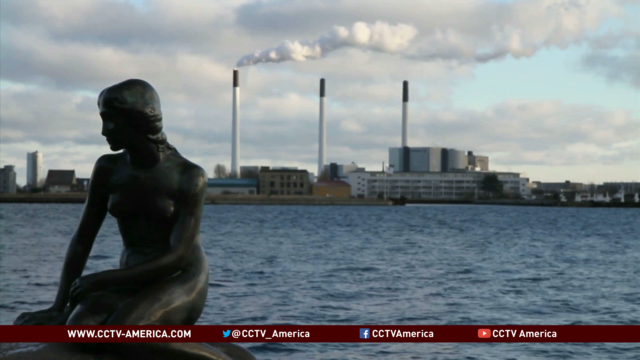A stark and sobering message came from an international panel of scientists assessing the impact of climate change: the world must stop using fossil fuels by the end of the century or face catastrophic consequences.
Flooding, food shortages and mass extinction of plants and animals are just some of the predictions. The Intergovernmental Panel on Climate Change (IPCC) revealed its devastating findings in the capital of Denmark, a country that is leading the world in efforts to become carbon neutral. The Danes are on target to generate 50 percent of their electricity from wind power by 2020.
It’s an example that U.N. Secretary-General Ban Ki-moon wants other nations to follow.
“If we act now, immediately and decisively, we have the means to build a better and more sustainable world,” he said.
CCTV America’s Malcolm Brabant reports.

In Copenhagen, where many people commute by bicycle, some fear the rest of the world does not take the environment as seriously as Denmark does. Some in the science community believe the world doesn’t have to give up fossil fuel completely if carbon capture and storage technology is more fully developed.
“We know how to inject carbon dioxide underground. They’ve been doing it for decades. We know how to capture carbon dioxide from power stations. We just need to put the things together,” Oxford University professor Myles Allen said. “We also need to get the policy framework in place to give companies and give countries the right incentives to get this very expensive technology progressed and deployed.”
Carbon capture is indeed among a menu of options the U.N. panel has laid out for action. However, like all its recommendations, money is a factor, as is the need for agreement among nations with varied levels of commitment and resources. The U.N. Secretary-General warned there was no ambiguity in the scientists’ message. He said that leaders must act and time wasn’t on their side.
For more on the U.N.’s climate change report, CCTV America talked with Angel Hsu, director of Yale’s Environmental Performance Measurement program. She is also a research scientist and lecturer at Yale’s school of Forestry and Environmental Studies.

For more on the reports implications, CCTV America interviewed Tyson Slocum, the director of the Public Citizen Energy Program.

 CGTN America
CGTN America
